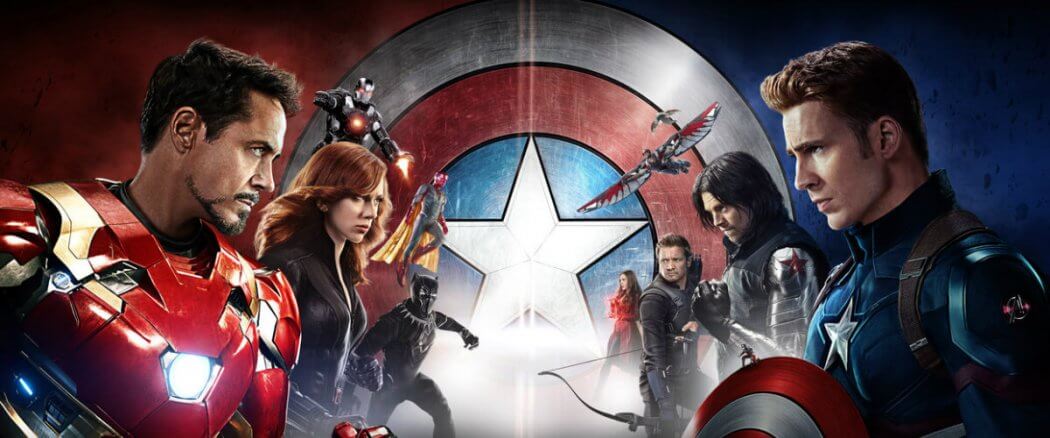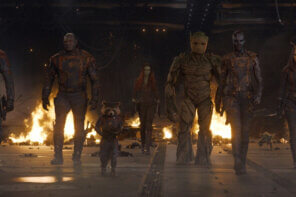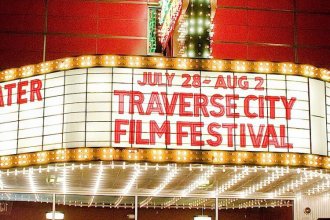Marvel’s at it again. This spring’s big hit is an adaption of the multiverse sensation Civil War for the newest Captain America movie. I remember 10 years ago spending hours in our local library reading this amazing story from as many points of view as they had, feeling the tension, fractures, sabotages, and trying to figure out who to root for in all this mess. The movie version tells the story in a gentler, more humorous, and family-friendly way than the comics*. That said, what we do have is a solid film, even with the introduction of two new characters, that explores themes of right and wrong, truth, unity amidst conflict, and the depth of friendship.
The film opens in Lagos, Nigeria where Captain America’s team (see close of Avengers II) are trying to stop a villain before he gets his hands on a super virus. They do, but not before causing an explosion in a building containing Wakandian aid workers (the Black Panther’s Kingdom) and other innocent bystanders. In response to this a coalition of 117 countries create the Sokovia accords (named for the city that Ultron lifted and the Avengers dropped out of the sky) which makes the Avengers a governmental program that takes orders and answers to superiors for any undue casualties. Iron Man, haunted by guilt and ghosts of victims, agrees to the accord; Captain America refuses.
Right and Wrong
One of the things Civil War does well is leave the question of who’s right and wrong up to the viewer. The characters root their decisions in objective views of right and wrong. The government and Iron Man talk about the damage done, needless loss of life, and lack of trust the global community has for these Ivory Tower Superheroes. The problem is he’s not honest about how his personal guilt and need for absolution drives his decision-making. Captain America references the greater good, need for little bureaucracy, and their privileged position as practitioners. As he acts he reveals that (like all of us) the greater good goes out the window when those we love are in danger**. I also couldn’t help but see all the things wrong with America personified in a super powered white man operating on foreign soil without local permission while claiming to know better than them about their safety.
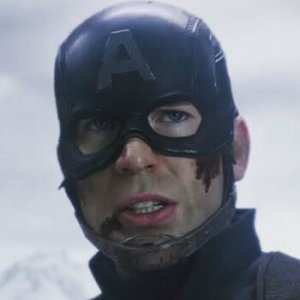 Think what could have happened differently if Iron Man looked at Captain America and said, “I can’t sleep at night. I feel responsible for every person we killed, and if this will ease my guilt one iota I have to sign.” Similarly, Cap could have said, “I’ve been a government project. I’ve given myself to them only to have them hold me back and make poor decisions. I can’t go back to that.” Together they could have come up with another option but no, they masked their mix of sincere beliefs and emotional baggage in opposing rhetoric and their world lost out for it.
Think what could have happened differently if Iron Man looked at Captain America and said, “I can’t sleep at night. I feel responsible for every person we killed, and if this will ease my guilt one iota I have to sign.” Similarly, Cap could have said, “I’ve been a government project. I’ve given myself to them only to have them hold me back and make poor decisions. I can’t go back to that.” Together they could have come up with another option but no, they masked their mix of sincere beliefs and emotional baggage in opposing rhetoric and their world lost out for it.
Standing betwixt these poles lies Black Panther. The Wakandian king steps on screen fairly inconspicuously but his fighting skills are on par with Bucky or Cap using only an intriguingly simple looking super suit. Also, while for most of the film he is driven by a need for revenge, he ends up being the only hero to recognize his limited frame of reference and lay his grudge aside to seek justice instead. He ends the film as one of the only characters trying to remain neutral.
Ultimately at the end of the movie the Avengers are disassembled. Throughout the film there are moments where Iron Man and Cap are able to lay down their disagreements and come together to face their common enemy. However, by the end of the movie there is only a slender thread holding them together. Initially united by a common mission without any sort of relationship, it is only this battle-tested relationship that enables some of them to even consider working together in the future. I don’t know how the heroes will unite again but I do know that Thanos is coming and will only be aided by a scattered defensive force unable to even face each other.
Division in the Church
As I watched Cap and Tony spiral farther and farther away from each other, I couldn’t help but thinking beyond the unity of the Avengers to the unity of the Church. As a gay man I’m constantly reminded that my life, my body, is a battleground that divides many in the Church world. Just this year the Anglican Communion disciplined the Episcopal Church because of its affirming, distancing it from their common life. The Presbyterian Church has already split*** over how they think I can live my life and barring a miracle the Mennonite and UMC are heading for the same fate.
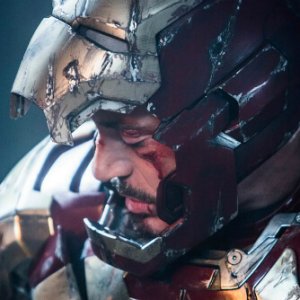 That said, my friends and I are far from the only group the church has found impossible to decide what to do with. Slavery, woman’s ordination, and payment for the best church pews (Hence Free Methodists) have all split Christian brothers and sisters. Some of those sound like they’re old issues, but I remember going to my grandfather’s church and remarking about their growth only for him to tell me they were refuges from the other church that hired a female pastor. And despite intentional effort these past decades, Sunday morning remains one of the most segregated times of the week.
That said, my friends and I are far from the only group the church has found impossible to decide what to do with. Slavery, woman’s ordination, and payment for the best church pews (Hence Free Methodists) have all split Christian brothers and sisters. Some of those sound like they’re old issues, but I remember going to my grandfather’s church and remarking about their growth only for him to tell me they were refuges from the other church that hired a female pastor. And despite intentional effort these past decades, Sunday morning remains one of the most segregated times of the week.
One advantage the Avengers have on the Church is that they acknowledge they’re waging a civil war, as opposed to a culture war. The heroes have disagreed to the point of exchanging blows, but they still don’t try and exile their former teammates to the status of “villain.” All too often I have seen this happen. Marvel’s mission held together by the sacrament of violence is a stronger bond than the Church’s mission held together by the sacrament of communion. I don’t know how we have come to view family members who disagree on significant cultural issues as disposable, but that is our current reality and it must end.
Remembering Our Mission
We too have a mission. Comics make their missions very simple: stop the bad guy. It’s clear, requires immediate action, and produces immediate results. Ours is more difficult to see and to know how to achieve progress. First off, unlike our caped crusaders, we believe Jesus has already saved the world. That said, we somehow participate in the continuation of that victory (we’re the cleanup crew). Some say to do this we need revival and stress evangelism, others stress the need to end oppression, still others the care for the least of these, and some of their actions are wildly different from one another. Since Jesus publicly preached a holistic gospel that was rooted in repentance, embraced by the least and last, and signaled the end of an oppressive religious system, we can safely say it’s a mix of these approaches.
Furthermore according to Jesus it is our unity that signals his reality (John 17:20-23). Personally, I think this will require more than the symbolic unity of the Eucharist. We have to find ways of working together in our localities, in ways that will expose us to the humanity, to the image of our common God in each other.
Ultimately, we believe there is an enemy greater than Thanos (though he does seem pretty badass) that threatens humanity. Jesus is the victor but that doesn’t mean some people can’t be lost, can’t spend their life crushed under the forces of evil in racism, militarization, and materialism. In fact, millions of our neighbors are in such a position. I need the people who bar me from the Table, they need me, the mission requires both of us; if that seems untenable ultimately Jesus said so. Until we believe this half as much as Captain American and Iron Man, our world will continue to suffer for it.
__________________________________________
*This is understandable since the movies (for all the cinematic time devoted to individual heroes) lacks the scope of the Marvel Universe. Viewers couldn’t be shocked at Peter Parker’s revelations (yes there are multiple) because we were just introduced to him. We couldn’t shed a collective tear as Sue and Johnny Storm quietly leave Richard a note explaining why they needed time away from each other because we have yet to have a viable film involving this family. We didn’t bear witness to Goliath’s long fall and internment after Thor’s clone shot a lightning bolt through the chest. Not to mention Iron Man and his use of the Green Goblin. Moral of the story is: read the comics.
**For all you Game of Throne fans out there, this movie actually made me hate Cersei a little less. Watching Captain America put his friend above the Avengers and thousands of people’s safety, I could hear Cersei whisper to Tommen, “I would burn cities to the ground to protect you.” When it came from her mouth I shivered and thought “You’re a monster,” but when Cap went to hell and back for Bucky I thought, “I can empathize with that.”
***Thankfully they chose the clear distinctions of Presbyterian Church USA and the Presbyterian Church of America. I never have been able to keep them straight. The pun’s free.

